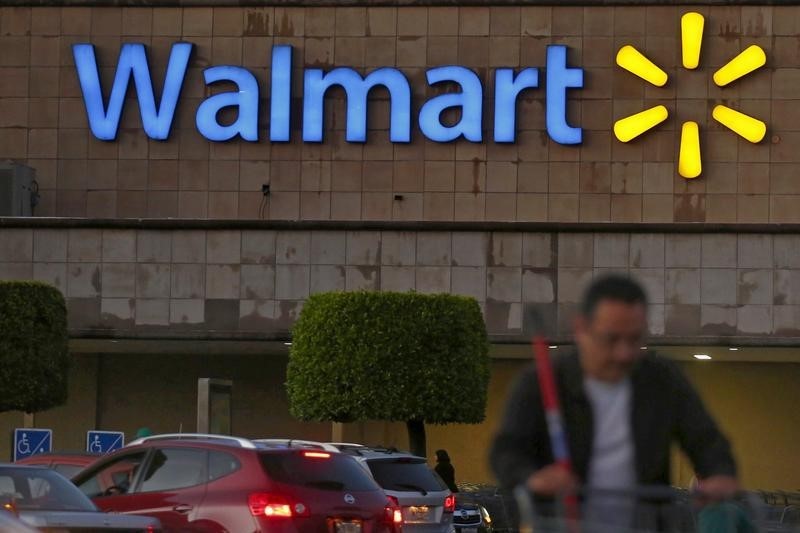Investing.com -- Here is your Pro Recap of the biggest earnings reports you may have missed this week: Walmart delivers a great quarter, Target and Home Depot suffer from soft consumer demand, and Alibaba earnings come in mixed.
InvestingPro subscribers got this news in rapid fire. Never be left in the dust again.
Walmart triumphs
Walmart (NYSE:WMT) defied inflationary pressures in Q1 and posted a bigger-than-anticipated sales jump on Thursday, taking in $152.3 billion - 7.6% higher than last year - thanks to strong performance at its e-commerce business and an uptick in grocery demand. Analysts were expecting $147.8B.
Sales at Walmart's key U.S. operations rose to $103.9B due in part to a 27% surge in its e-commerce operations, particularly in advertising as well as pickup and delivery services. The unit also made gains in grocery sales, including in higher-income households.
Walmart faces a challenge to keep prices low as inflation threatens to increase input costs, Investing.com's Damian Nowiszewski said. According to DataWeave statistics, the retail giant's average prices rose by just 3% for a selected basket of nearly 600 products between early 2022 and February 2023. This is under both the average inflation rate and Walmart's closest competitors, Nowiszewski noted.
Walmart shares were rising 2% to about $152 in early trading Thursday.
Home Depot hit by slack consumer demand
On the other hand, Home Depot (NYSE:HD) on Tuesday missed Q1 Wall Street expectations as cost-of-living worries persuaded many shoppers to rein in non-essential spending: The company earned $3.82 per share, missing the $3.87 estimate.
The home improvement retailer also now forecasts a bigger full-year earnings slide - 7% to 13% vs. its prior expectation of a mid-single-digit decline. And it now thinks full-year sales and comparable sales (numbers from stores open at least a year) will shrink by 2% to 5%, down from its prior estimate of flat sales.
CFO Richard McPhail attributed the disappointing guidance to "the negative impact to first quarter sales from lumber deflation and weather, further softening of demand relative to our expectations, and continued uncertainty regarding consumer demand."
Truist said the results were widely expected, as the quarter was "difficult for most retailers, especially those with outdoor exposure."
But CFRA cut the stock to Hold from Buy given "near-term headwinds," including a forecasted decline in home remodeling next year.
Bernstein maintained Market Perform on the stock but cut its price target $314 from $333. As InvestingPro reported in real-time, the research firm told clients that they are concerned that management "didn't see the 200+bps headwind from lumber deflation. And we're also concerned -- more so, really -- with weaker-than-expected consumer demand."
Bernstein added that the HD sell-off may have created a short-term tactical buying opportunity for Lowe’s (NYSE:LOW) and Floor & Decor Holdings, Inc. (NYSE:FND).
Home Depot shares lost more than 2% on Tuesday but recovered in the next session.
Target outlook dented as consumers remain 'under pressure'
Elsewhere in the retail space, on Wednesday, Target (NYSE:TGT) said it made $2.05 per share in Q1, surpassing the $1.79 Street estimate, on in-line revenue of $25.32B. Comparable store sales were flat, whereas analysts were looking for them to tick 0.2% higher vs. a year earlier.
But Goldman Sachs noted "improvement" in its inventory position: Inventory fell 16% year-over-year, fueled by a 25% reduction in discretionary merchandise categories. Goldman also cited its improving operating margin.
Stifel meanwhile called Target's numbers "solid" given "a muted discretionary spending environment."
For the current quarter, Target sees EPS at a lower-expected range of $1.30 to $1.70 "based on softening sales trends in the first quarter." Analysts had been looking for $1.93. And it sees full-year earnings at $8.25 per share, under the $8.44 Street estimate
“The consumer is under pressure,” Chief Growth Officer Christina Hennington said on a call with reporters. “The consistent inflation, the running out of savings as well as just economic uncertainty in general is having an impact on their choices and they’re making tradeoffs.”
Shares rose 2.6% during Wednesday's session, although profit-taking hit the stock early Thursday.
Alibaba slumps after mixed earnings
Alibaba (NYSE:BABA) slumped more than 4% in early trading Thursday after missing Q1 revenue expectations, even as it beat on earnings.
The Chinese tech giant reported Q1 EPS of RMB 10.71, RMB 1.25 better than the analyst estimate of RMB 9.46. However, revenue of RMB 208.2B in the quarter, which rose 2% YoY, was below the consensus estimate of RMB 209.02B.
The gross merchandise value of online physical goods declined in the mid-single digits on Alibaba's Taobao and Tmall platforms, excluding unpaid orders.
Meanwhile, direct sales and other revenue decreased by 1% from a year earlier, mainly due to a decrease in offline store sales, which was negatively impacted by COVID-19 disruption in January and seasonal volatility along with "normalizing grocery demand due to decrease in consumer hoarding behavior post-COVID-19."
Alibaba also revealed that has approved a full spin-off of the Cloud Intelligence Group via a stock dividend distribution to shareholders, with the intention that it become an independent publicly listed company.
"We intend to structure the spin-off in the most tax-efficient way for our shareholders. Subject to the transactions, conditions and approvals described above, we target to complete the spin-off in the next 12 months," Alibaba said.
Shares were recently changing hands at around $86.
Senad Karaahmetovic, Scott Kanowsky, and Sam Boughedda contributed to this report.
Amid whipsaw markets and a slew of critical headlines, seize on the right timing to protect your profits: Always be the first to know with InvestingPro.


